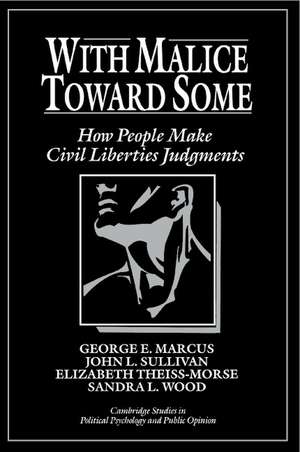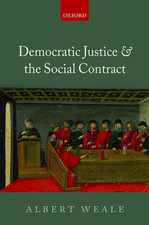With Malice toward Some: How People Make Civil Liberties Judgments: Cambridge Studies in Public Opinion and Political Psychology
Autor George E. Marcus, John L. Sullivan, Elizabeth Theiss-Morse, Sandra L. Wooden Limba Engleză Paperback – 28 sep 1995
| Toate formatele și edițiile | Preț | Express |
|---|---|---|
| Paperback (1) | 285.75 lei 6-8 săpt. | |
| Cambridge University Press – 28 sep 1995 | 285.75 lei 6-8 săpt. | |
| Hardback (1) | 804.84 lei 6-8 săpt. | |
| Cambridge University Press – 26 oct 1995 | 804.84 lei 6-8 săpt. |
Din seria Cambridge Studies in Public Opinion and Political Psychology
-
 Preț: 166.99 lei
Preț: 166.99 lei - 14%
 Preț: 694.64 lei
Preț: 694.64 lei -
 Preț: 227.65 lei
Preț: 227.65 lei -
 Preț: 205.84 lei
Preț: 205.84 lei -
 Preț: 267.95 lei
Preț: 267.95 lei -
 Preț: 268.38 lei
Preț: 268.38 lei -
 Preț: 364.26 lei
Preț: 364.26 lei -
 Preț: 223.29 lei
Preț: 223.29 lei -
 Preț: 223.29 lei
Preț: 223.29 lei -
 Preț: 227.45 lei
Preț: 227.45 lei -
 Preț: 226.46 lei
Preț: 226.46 lei -
 Preț: 287.28 lei
Preț: 287.28 lei -
 Preț: 288.25 lei
Preț: 288.25 lei -
 Preț: 263.00 lei
Preț: 263.00 lei -
 Preț: 229.56 lei
Preț: 229.56 lei -
 Preț: 287.87 lei
Preț: 287.87 lei - 11%
 Preț: 556.32 lei
Preț: 556.32 lei -
 Preț: 286.89 lei
Preț: 286.89 lei -
 Preț: 225.20 lei
Preț: 225.20 lei -
 Preț: 280.91 lei
Preț: 280.91 lei -
 Preț: 201.59 lei
Preț: 201.59 lei - 11%
 Preț: 573.26 lei
Preț: 573.26 lei -
 Preț: 271.98 lei
Preț: 271.98 lei - 11%
 Preț: 554.48 lei
Preț: 554.48 lei -
 Preț: 260.11 lei
Preț: 260.11 lei -
 Preț: 322.89 lei
Preț: 322.89 lei -
 Preț: 384.34 lei
Preț: 384.34 lei -
 Preț: 224.62 lei
Preț: 224.62 lei -
 Preț: 265.11 lei
Preț: 265.11 lei
Preț: 285.75 lei
Nou
Puncte Express: 429
Preț estimativ în valută:
54.68€ • 57.35$ • 45.52£
54.68€ • 57.35$ • 45.52£
Carte tipărită la comandă
Livrare economică 01-15 aprilie
Preluare comenzi: 021 569.72.76
Specificații
ISBN-13: 9780521439978
ISBN-10: 0521439973
Pagini: 308
Ilustrații: 27 b/w illus. 24 tables
Dimensiuni: 152 x 229 x 18 mm
Greutate: 0.4 kg
Ediția:New.
Editura: Cambridge University Press
Colecția Cambridge University Press
Seria Cambridge Studies in Public Opinion and Political Psychology
Locul publicării:New York, United States
ISBN-10: 0521439973
Pagini: 308
Ilustrații: 27 b/w illus. 24 tables
Dimensiuni: 152 x 229 x 18 mm
Greutate: 0.4 kg
Ediția:New.
Editura: Cambridge University Press
Colecția Cambridge University Press
Seria Cambridge Studies in Public Opinion and Political Psychology
Locul publicării:New York, United States
Cuprins
Preface: Political tolerance and democratic life; Part I. Theoretical Background and Overview: 1. Political tolerance and democratic practice; 2. Antecedent considerations and contemporary information; 3. Thinking and mood; Part II. Contemporary Information and Political Tolerance Judgments: 4. Tolerance judgments and contemporary information - the basic studies; Appendix 4A. The basic experiments - manipulation checks; Part III. Refining the Model - The Role of Antecedent Conserations as Individual Differences: 5. Threat and political tolerance; 6. Democratic values as standing decisions and contemporary information; 7. Source credibility, political knowledge and animus in making tolerance judgments - the Texas experiment; 8. Individual differences: The influence of personality; Part IV. Implications and Conclusions: 9. Intensity, motivations, and behavioral intentions; 10. Human nature and political tolerance; Appendices; Bibliography.
Recenzii
"The authors have excelled in providing a framework that effectively synthesizes and gives order to disparate perspectives on tolerance judgments." Public Opinion Quarterly
"...an entirely innovative approach to understanding the dynamics of political intolerance....None who care about public opinion and democracy can afford to ignore this most important book." American Politics
"...an entirely innovative approach to understanding the dynamics of political intolerance....None who care about public opinion and democracy can afford to ignore this most important book." American Politics
Descriere
The authors examine how citizens faced with a complex variety of considerations decide whether or not to tolerate extremist groups.












